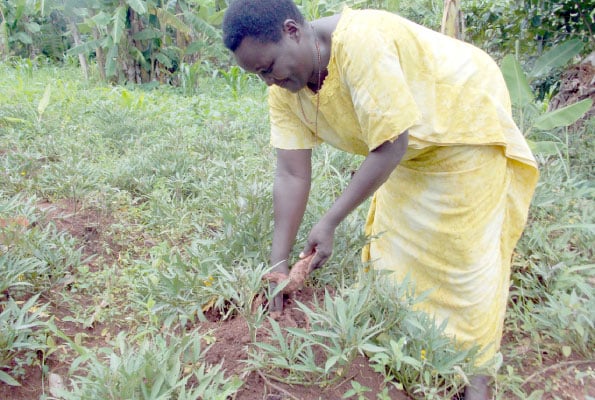MAAIF empowers farmers with better seed and market access

Eggplants. Photo/File/Faiswal Kasirye.
What you need to know:
- Recently, scientist at the National Agricultural Research Laboratories (NARL) introduced genetically modified bananas that are rich in vitamin A and iron.
- This groundbreaking modification took the scientists a period of 20 years to create the orange tint in the flesh of the bananas.
While Mr Rogers Wasibi has been a coffee farmer all his life, nothing has come out of it. If it was not the bad prices, roads, weather or poor-quality farm inputs, it was the middlemen who took everything.
“Some farmers were selling coffee ‘flowers’, others berries as soon as they ripened to the middlemen; yet it was hard to quantify so they ended up making little or no profit,” he said.
Mr Ronald Kyozira and his fellow farmers in Bulunguli village, Bugweri District had similar challenges. Additionally, some middlemen baited the farmers by bringing and selling them seeds on the premise that they lower their selling prices. Having no easier way to get agro-inputs due to bad roads, they had no choice but to give in.
“Even if we had a way of getting the inputs, taking our produce to the market was tough in the face of poor road network and long distances. Therefore, middlemen had an upper hand, buying from us at the lowest price possible,” he says.
Mr Moses Tenywa, the chairperson of Agali Awamu Multipurpose Association says the other problem is poor seed quality, which hampers business.
“Owing to lack of rice processing machines, we sold unhusked rice whose proceeds were very low,” he says.
Forming groups
The farmers that Seeds of Gold spoke to say it is difficult to overcome these obstacles in agriculture alone. This prompted them to form cooperatives for better price bargaining power.
“We formed Mt Elgon Coffee and Honey Cooperative Society where we ably mobilise the farmers and do collective selling of our coffee. That also allows us better price determination, cutting out the middleman. The society started with 331 farmers and has grown to 824,” Mr Wasibi said.
Improved on-farm production
Ministry of Agriculture, Animal Industry and Fisheries (MAAIF) through the Agriculture Cluster Development Project (ACDP) has also worked to boost the quality and quantity of farmer production.
According to Dr Henry Nakelet Opolot, the coordinator of ACDP, the project has supported the sector through time-bound, partial and diminishing matching grants to selected farmers.
“This helped farmers finance the purchase of the key inputs such as improved planting seed, fertilisers, pesticides, tractor hire services, agriculture insurance, and on-farm storage facilities at subsidised rates. This was under the e-Voucher Scheme,” he says.
Mr Moses Erongu, Senior Agricultural Inspector of the MAAIF says many farmers welcomed the e-voucher method.
“The e-voucher helped us mobilise contributions from farmers up to the tune of Shs41bn as a co-funding for the inputs they were taking,” Erongu added.
Adding, “We enrolled as many dealers as possible to give farmers a choice of who to supply them. These dealers met the credentials in terms of supplying quality inputs, capacity to supply, and presence of their outlets within the farmers’ territories.”
Mr Wasibi says is thankful for better seed quality because output has greatly improved. “Initially, each acre gave us nine bags of rice and four bags of maize. Today, we get up to 20 bags of rice per acre, which is attributed to the quality inputs, especially seeds we got through the e-voucher system,” he says.
Mr Tenywa adds that they have been linked to different agro-input suppliers, which enables us to access subsidised inputs that are delivered at your door. The drive to intensify on-farm production also involves capacity building for target beneficiaries and farmers on the most effective use of these same inputs.
Value addition
Dr Opolot, who is also the commissioner of agricultural extension and skills management says through the project, farmers have got better access to markets and improved post-harvest handling facilities for processing of farm produce.
Mr Wasibi says through the matching grant, they got machinery hence establishing a coffee processing facility and later got a quality mark (Q-mark) from the Uganda National Bureau of Standards (UNBS). That speaks to improved product quality.
Mr Tenywa says Agali Awamu Cooperative received a rice processing facility from ACDP allowing them to add value to the rice for better prices.
“We received machines with a milling capacity of between 7,000 and 12,000 kilogrammes per day hence bulking our produce,” he says.
Market access
To ensure market access, ACDP worked to eliminate bottlenecks and trouble spots in rural access roads critical for the movement of farm produce to markets. This is crucial to facilitate the supply of agricultural inputs and the evacuation of goods to bulking or marketing centres.
“Previously, farmers experienced challenges with the movement of produce from the community to markets, especially during the rainy season where bridges were washed away by floods and swampy sections of the road got blocked thus impeding the movement of trucks. Therefore, the project has seen to the rehabilitation of several road chokes on access roads to ease the evacuation of farm produce from production areas to bulking/value addition facilities and markets.,” Dr Opolot says. Consequently, in each district, ACDP assisted local governments in their efforts to remove chokepoints on farm access routes.
Mr Kyozira, the chairperson of Bulunguli Multipurpose Farmers’ Cooperative Society commends the rehabilitation of community roads hence better access to markets, value-addition facilities and agro-input stores.
He adds that the area also has power connectivity. “The advent of post-harvest handling machines attracted power line connectivity. This has helped in processing and value addition, reducing the spread of aflatoxins and improving quality,” he says.




